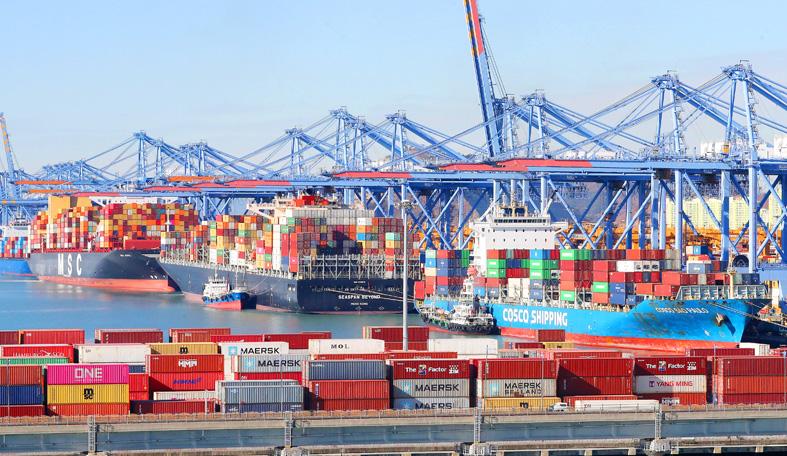South Korea’s exports to China dropped last month, highlighting the impact that COVID-19-related lockdowns in Chinese cities are having on supply chains around the region.
Shipments to China fell 3.4 percent from a year earlier, compared with a 16.6 percent gain in March, the South Korean Ministry of Trade, Industry and Energy said in a statement yesterday.
Overall exports advanced 12.6 percent last month, while semiconductor sales increased 15.8 percent.

Photo: EPA-EFE
South Korea is a barometer of worldwide demand, with its manufacturing capability ranging from chips to displays and refined oil. The diversity of destinations for its overseas shipments also means its trade performance is something of a heat map for global economic activity.
Demand has been softening in Europe and China since Russia’s invasion of Ukraine, as more Chinese cities go into lockdown under the country’s “zero COVID” policy. These twin risks to the global economy have further inflamed inflationary pressures and triggered renewed disruptions in supply chains.
Still, a strong recovery in the US has helped maintain momentum for South Korean exports. Demand for technology products such as displays and semiconductors also remains resilient, allowing major exporters like Samsung Electronics Co to report a surge in earnings.
South Korea’s heavy reliance on trade means it needs exports to hold up to prevent the economy from slowing further, and provide scope for the Bank of Korea to stick to its path of policy normalization.
The central bank is scheduled to meet this month and is battling to rein in unexpectedly strong inflation. It has been among the early movers in raising interest rates.
Sunday’s data also showed average daily shipments increased 15 percent last month from a year earlier.
Total automobile exports advanced 6.1 percent last month, while shipments of wireless communications devices rose 8.3 percent.
Overall exports to the US gained 26.4 percent, while those to Japan increased 6.2 percent and to the EU they were up 7.4 percent.
Exports to the Commonwealth of Independent States fell 46.5 percent.

The DBS Foundation yesterday announced the launch of two flagship programs, “Silver Motion” and “Happier Caregiver, Healthier Seniors,” in partnership with CCILU Ltd, Hondao Senior Citizens’ Welfare Foundation and the Garden of Hope Foundation to help Taiwan face the challenges of a rapidly aging population. The foundation said it would invest S$4.91 million (US$3.8 million) over three years to foster inclusion and resilience in an aging society. “Aging may bring challenges, but it also brings opportunities. With many Asian markets rapidly becoming super-aged, the DBS Foundation is working with a regional ecosystem of like-minded partners across the private, public and people sectors

BREAKTHROUGH TECH: Powertech expects its fan-out PLP system to become mainstream, saying it can offer three-times greater production throughput Chip packaging service provider Powertech Technology Inc (力成科技) plans to more than double its capital expenditures next year to more than NT$40 billion (US$1.31 billion) as demand for its new panel-level packaging (PLP) technology, primarily used in chips for artificial intelligence (AI) applications, has greatly exceeded what it can supply. A significant portion of the budget, about US$1 billion, would be earmarked for fan-out PLP technology, Powertech told investors yesterday. Its heavy investment in fan-out PLP technology over the past 10 years is expected to bear fruit in 2027 after the technology enters volume production, it said, adding that the tech would

YEAR-END BOOST: The holiday shopping season in the US and Europe, combined with rising demand for AI applications, is expected to drive exports to a new high, the NDC said Taiwan’s business climate monitor improved last month, transitioning from steady growth for the first time in five months, as robust global demand for artificial intelligence (AI) products and new iPhone shipments boosted exports and corporate sales, the National Development Council (NDC) said yesterday. The council uses a five-color system to measure the nation’s economic state, with “green” indicating steady growth, “red” suggesting a boom and “blue” reflecting a recession. “Yellow-red” and “yellow-blue” suggest a transition to a stronger or weaker condition. The total score of the monitor’s composite index rose to 35 points from a revised 31 in August, ending a four-month

RUN IT BACK: A succesful first project working with hyperscalers to design chips encouraged MediaTek to start a second project, aiming to hit stride in 2028 MediaTek Inc (聯發科), the world’s biggest smartphone chip supplier, yesterday said it is engaging a second hyperscaler to help design artificial intelligence (AI) accelerators used in data centers following a similar project expected to generate revenue streams soon. The first AI accelerator project is to bring in US$1 billion revenue next year and several billion US dollars more in 2027, MediaTek chief executive officer Rick Tsai (蔡力行) told a virtual investor conference yesterday. The second AI accelerator project is expected to contribute to revenue beginning in 2028, Tsai said. MediaTek yesterday raised its revenue forecast for the global AI accelerator used